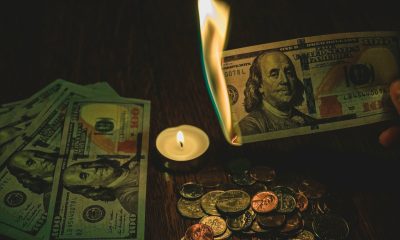Featured
The economic battle and the fed’s latest bond-buying program
The Irrational Economic Summit was like a battlefield where experts presented their arguments of where to invest, how to protect your wealth and how to navigate your business and investments through the current chaos facing the US and global economy. There David Stockman and Lacy Hunt clashed on the Fed issue, especially on the latest Fed bond-buying program and what it means for the economy.

The two fighters were nice enough to each other. They exchanged pleasantries, took their places on the stage, and then began to trade their blows. This took place at our Irrational Economic Summit over the weekend when David Stockman and Lacy Hunt squared off and went at it. The topic was the Fed – or more specifically, the Fed’s latest bond-buying program, and what it means for the economy.
Lacy, in his southerly Texan way, disagreed.
To him, the Fed is simply taking care of a housekeeping issue that should never have been allowed to exist. The Fed controls money supply, and is well aware of the consequences of the Systemically Important Financial Institution (SIFI) designation.

Financial companies tagged with SIFI must hold larger, higher quality capital cushions than others, so they aren’t as likely to lend their deposits to other banks. As excess reserves eased out of the banking system through increasing loans and the dwindling Fed balance sheet, institutions of many types couldn’t get their hands on enough cash to meet their short-term, and often overnight, obligations.
The repo market, where such institutions can borrow money for a day or two, ran out of cash. There weren’t enough lenders to meet demand. The Fed is buying very short-term Treasury Bills just to put enough cash in the system to grease the repo wheels.
Two Experts at Work
In a way, both Stockman and Hunt were right. By definition it’s quantitative easing, but the effects on the bond market should be negligible.
The sparring was fun to watch, and then moved on to other topics. Should we return to the gold standard? Should the Fed adjust money supply and interest rates? Or should the Fed exist at all? Every topic drew a sharp, smart response from both sides, which were often at odds.
David Stockman is certain the Fed has little purpose. Market forces should be allowed to discover prices, which will show up as interest rates on bonds, loans, and deposits.
Dr. Hunt sees the Fed as a bedrock of our monetary system. However, he thinks they’ve overplayed their hand and done things since the financial crisis that, while well-intended, have created huge, misaligned asset prices.

This rapid-fire exchange between two men distinguished in their fields exemplified the 2019 Irrational Economic Summit. It also explains why I always look forward to these events , and come away mentally exhausted!
If you weren’t fortunate enough to be there or watch it live, visit our website and get access on demand , it’s definitely worth your time!
One Big Test
As Lacy and Stockman went back and forth, it reminded me that we’re in the middle of a huge financial experiment. Central banks around the world printed $26 trillion of new money since the financial crisis,
while governments went further into debt. As Lacy pointed out, every time in history that a developed nation has incurred large amounts of debt, it has endured a period of austerity to unwind the debt and get back to normal GDP growth.
This time, as we face a $22 trillion national debt and GDP growth of just 2%, our central bank has already deployed the tools in its arsenal.
I’m not sure exactly what the financial austerity ahead looks like, but I’ll bet that it means bursting asset bubble prices in many areas, including stocks and real estate. That’s an outcome on which even Lacy Hunt and David Stockman seemed to agree.
—
(Featured image by George Becker via Pexels)
DISCLAIMER: This article expresses my own ideas and opinions. Any information I have shared are from sources that I believe to be reliable and accurate. I did not receive any financial compensation for writing this post, nor do I own any shares in any company I’ve mentioned. I encourage any reader to do their own diligent research first before making any investment decisions.

-

 Crowdfunding1 week ago
Crowdfunding1 week agoPMG Empowers Italian SMEs with Performance Marketing and Investor-Friendly Crowdfunding
-

 Markets5 days ago
Markets5 days agoMarkets Wobble After Highs as Tariffs Rise and Commodities Soar
-

 Markets2 weeks ago
Markets2 weeks agoThe Big Beautiful Bill: Market Highs Mask Debt and Divergence
-

 Africa2 days ago
Africa2 days agoORA Technologies Secures $7.5M from Local Investors, Boosting Morocco’s Tech Independence
























